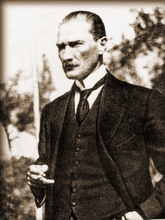In a sample dialogue (konuşma) in my textbook, a visitor to Turkey is greeted by an immigration officer. Their exchange included a predictable set of appropriate greetings.
One of them was memur bey, said by the visitor to the official. Literally, this means "official mister". But, the translation is similar to what you might say to a policeman approaching you: "Hello officer"...or "I didn't do it!!" (kidding, of course).
At www.turkishdictionary.net, the following information is provided on a search of bey:
1. gentleman, sir; a title meaning Mr. (used after a first name): Mehmet Bey.
2. prince, ruler, chieftain; chief, head, master.
3. notable, country gentleman.
4. playing cards ace.
In short, bey conveys respect.
Keeping that in mind, a common greeting by someone providing you with a service is beyefendi. Efendi means gentleman. Bey, in effect, stresses a positive message. It ends up meaning sir.
In the same vein, hanımefendi means madam. Efendi can apparently mean madam too as well as meaning sir.
Here's a phrase I'll likely be using often in Turkey: efendim? As in, "I beg your pardon! Sorry! Can you repeat that, please?"
The Turkish equivalents for Mr., Mrs. or Miss are Bey and Hanım, respectively. Curveball: Unlike English, Bey and Hanım are used with the first name, not the surname. So, instead of John Smith being called Mr. Smith, he's John Bey. His wife, Jane, would be Jane Hanım.
Practical use for bey: say you're trying to hail a bus driver, say şoför bey! The respect should come naturally — i.e., respect the fact that you want something from the driver: to stop!/durmak!
Wednesday, February 21, 2007
Subscribe to:
Post Comments (Atom)


No comments:
Post a Comment